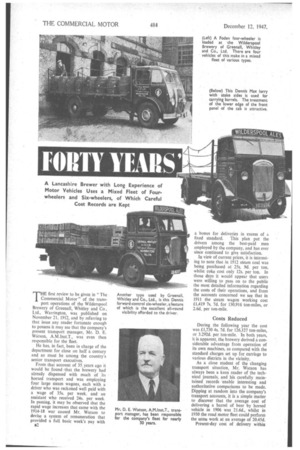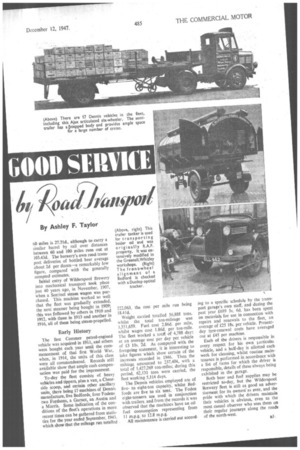FORTY YEARS'
Page 36

Page 37

If you've noticed an error in this article please click here to report it so we can fix it.
ad7//altrolti
By Ashley F. Taylor
A Lancashire Brewer with Long Experience of Motor Vehicles Uses a Mixed Fleet of Fourwheelers and Six-wheelers, of Which Careful Cost Records are Kept THE first review to be given in "The Commercial Motor' of the transport operations of the Wilderspool Brewery of Greenall, Whitley and Co, Ltd., Warrington, was published on November 21, 1912, and by referring to that issue any reader fortunate enough to possess it may see that the company's present transport manager, Mr. D. E. Watson, A.M.Inst.T., was even then responsible for the fleet.
He has, in fact, been in charge of the department for close on half a century and so must be among the country's senior transport executives.
From that account of 35, years ago it would be found that the brewery had already dispensed with much of its horsed transport and was employing four large steam wagons, each with a driver who was reckoned well paid with a wage of 35s. per week, and an assistant who received 24s. per week, In passing, it may be observed that the rapid wage increases that came with the 1914-18 war caused Mr. Watson to devise a system of remuneration that provided a full basic week's pay with B2
a bonus for deliveries in excess of a fixed standard. This plan put the drivers among the best-paid men employed by the company, and has ever since continued to give satisfaction.
In view of current prices, it is interesting to note that in 1912 steam coal was being purchased at 25s, 9d. per ton, whilst coke cost only 12s. per ton. In those days it would appear that users were willing to pass on to the public the most detailed information regarding the costs of their operations, and from the accounts concerned we see that in 1911 the steam wagon working cost £1,419 7s. 7d. for 130,916 ton-miles, or 2.6d. per ton-mile.
Costs Reduced During the following year the cost was £1,730 4s. 7d. for 126,127 ton-miles, or 3.292d. per ton-mile. In both years, it is apparent, the brewery derived a considerable advantage from operation of its own machines, as compared with the standard charges set up for carriage to various districts in the vicinity.
As a close student of the changing transport situation, Mr. Watson has always been a keen reader of the technical journals, and his carefully maintained records enable interesting and authoritative comparisons to be made. Dipping at random into the company's transport accounts, it is a simple matter to discover that the average cost of delivering a barrel of beer by horsed vehicle in 1906 was 21.6d., whilst in 1930 the road motor fleet could perform the same work at an average of 20.45d.
Present-day cost of delivery within
60 milts is. 27.71d.„ although to carry a similar barrel by rail over distances between 60 and 100miles runs out at 103.43d. The brewery's own road trans.port deliveries of bottled beer average about 2d per dozen—a remarkably tow figere, compared with the generally accepted estimates.
Initial entry of Wilderspool Brewery into mechanical transport took place just 40 years ago, in November, 1907, when a Sentinel stoma wagon was purchased. This machine worked so well that the fleet was gradually extended. the next steamer being bought in 1909; this was followed by others in 1910 and 1912, with three in 1911 and another in 1916, all of them being steam-propelled.
Early History The first Commapetrol-engieed vehicle was acquired in 1911, and others were bought each year until the commencement of that first World War, when, in 1914, the units of this. class were all commandeered. Records still available show that ample cash compensation was paid for the impressment.
To-day the fleet consists of heavy vehicles and tippers, plus a van, a Chaseside scoop, and certain other ancillary units, there being 17 machines. of Dennis tnartufacture, five Bedfords, four Fodens, two Fordsons, a Garner, an. Austin and a Words. Some indication of the conditions of the fleet's operations in more recent times can be gathered from statistics for the year ended September, 1943, which show that the mileage run totalled 222.063, the cost per mile run being 18.4td„ Weight carried totalled 56,888 tons, whilst the total ton-mileage was 1,351,659. Fuel cost 2.86d. per mile, whilst wages cost 1.86d. per ton-mile. The fleet worked a tote of 4,78'8 dar, at an average cost per day per vehicle of £.3 11s. 2d. As compared with the foregoing statement, it is interesting to take figures which show certain of the increases recorded in 1946. Then the mileage amounted to 237,404, with a total of 1,427,269 ton-miles; during this. period, 62,131 tons were carried, the fleet working 5,414 days.
The Dennis vehicles employed are of fiveto eight-ton capacity, whilst Bedfords are five to six tons. The Foden eight-tonners are used in conjunction with trailers. and from the records it was observed that the machines have an oil fuel consumption representing from 11 m.p.g. to 12.8' m.p.g.
All maintenance is carried out accord-. ing to a specific schedule by the transport garage's own staff, and during the past year £699 3s. 6d. has been spent on materials for use in connection with repairs and renewals to the fleet, an average of £25 18s. per vehicle. Presentday tyre-renewal costs have averaged out at £45 per machine..
Each of the drivers is responsible in every respect for his own particulai vehicle, and a half-day is allotted each week for cleaning, whilst routine main. teriance is performed in accordance with a list of items for which the driver is responsible, details of these always being exhibited in the garage.
Bath beer and fuel supplies may be restricted to-day, but the Wilderspool Brewery fleet is still as. good an advertisement for its owners as ever, and the pride with which the drivers maintain their vehicles is obvious, even to the most casual observer who sees them on their regular journeys along the roads of the north-west.




















































































